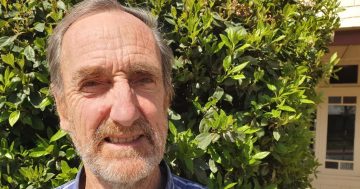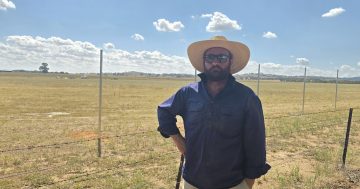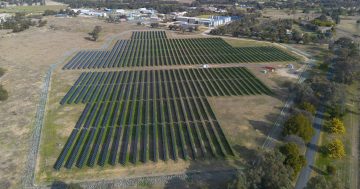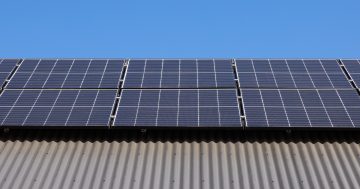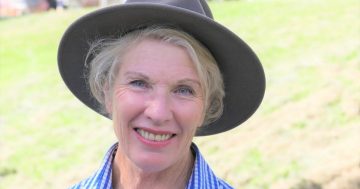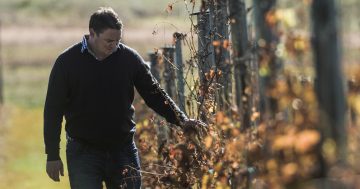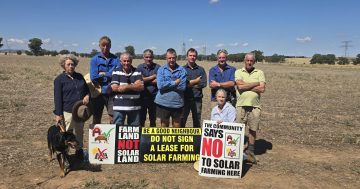
Ken Keith’s sheep grazing under solar panels have done better than the sheep under normal farming conditions. As well as maximising rainfall, the panels provide valuable shelter for his livestock. Photo: Supplied.
A public forum in Goulburn this month will shed light on the proposed billions of dollars worth of renewable energy projects surrounding the city and dividing landholders and community leaders.
Community action group The Goulburn Group says the proponents of these projects at Gundary, Tirrannaville and Marulan should be consulting more with landholders and be more specific on compensation for loss of amenity.
TGG has organised three speakers who will spell out how the Goulburn community and landholders can make the most of solar farms.
At the forum on Tuesday 14 March, (booking details below) internationally renowned expert on solar energy and engineering’s “Nobel Prize” winner, Andrew Blakers will explain the enormous opportunities he sees for renewable energy in the community.
As well, a fine wool and sheep meat producer from Parkes, Ken Keith, will share his experience of living on the boundary of a big solar farm and grazing his livestock under the solar panels. This helped him through a drought without having to hand-feed his animals.
When French renewable energy producer Neoen established a solar farm on Mr Keith’s boundary in 2018, the company said grazing under panels was done everywhere in France.
Mayor of Parkes, Mr Keith has found Neoen’s farm compatible with his livelihood on his 809-hectare property which he has farmed since 1979. He said the State Government had not enforced a tree line on his boundary because his house was over the hill and he couldn’t see the panels from his house.
But tree lines were enforced on other boundaries and native eucalypts and wattles were established.
“Once done, it (the solar panels) actually wasn’t that unsightly,” he said. “When I’m on my hill looking down at the solar farm, it just looks like a big lake – it looks like water. The sun doesn’t shine off it, it’s like you are looking at an expanse of water,” he said.
During a recent drought, one of the worst they had experienced, the solar farm was a useful catchment. Mr Keith said even a small amount of 5mm rain which didn’t do much on his farm, was significant under the solar panels.
“Because the solar panels ran it (rainwater) all down into a line, it became equivalent to 25mm on the ground in that strip,” he said. “A drip line would drip more on cold, dewy mornings so there was always a green pick during the drought.”
Now in the planning assessment phase with the NSW Government, the 150 megawatt Marulan solar farm will provide 300 jobs during construction and 50 jobs for maintenance work. But Goulburn Mulwaree Council has questioned why accommodation for the workforce wasn’t assessed as part of the application.
The council has several concerns, and Professor Blakers, from the School of Engineering at the Australian National University, will speak on how to help local councils and landholders when negotiating with renewable energy developers.
Alongside three colleagues, Professor Blakers has just won the Queen Elizabeth Prize for Engineering – the world’s most prestigious engineering prize and known colloquially as the “Nobel prize for engineering”. He has been recognised for his work as lead inventor of the silicon solar cell technology that has seen the spread of high performance, low-cost solar electricity throughout the world.
Recent published research with Professor Blakers’ colleagues has identified the Goulburn district as a particularly attractive region for solar and wind farms in NSW. It’s well served by transmission and has good wind and solar resources.
As well, Professor Blakers says the Goulburn region has good resources for pumped hydro projects, where water is pumped uphill during the day using renewable energy and can be drawn on at night to generate electricity, providing an important solution to storing power.
The research includes so-called heat maps that allow anyone to focus in detail on areas to see how well suited they are to renewable energy. The aim is to give communities, landholders and local councils the knowledge to negotiate with renewable energy developers, reducing the imbalance in favour of the developers of renewable energy.
The meeting will also hear from Goulburn Mulwaree Landcare president Julia McKay, who will speak on the research she has conducted into agrovoltaics – growing vegetables and other horticulture on solar farms, a practice increasingly being adopted overseas.
Admission to the 14 March meeting, which begins at 7 pm, is free, but those attending are asked to register with Eventbrite.








